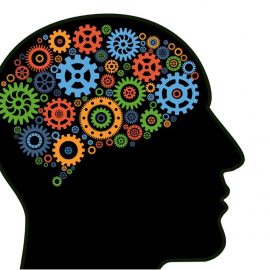
Does consumerism negatively affect your mental health? Does shopping distract you from the difficulties of life?
It might be surprising to learn that consumerism has a negative effect on your mental health. While buying things can be satisfying, it also prevents you from solving real issues that need to be addressed.
Here’s how consumerism and mental health go hand in hand, according to The Wisdom of Insecurity by Alan Watts.
How You’re Making Your Anxiety Worse
Watts notes that despite the utility of pain and death, your anxiety about these experiences leads you to pursue an endless stream of pleasure. You know your time on earth is limited and that pleasures aren’t promised, so you want to cram as much pleasure into your life as possible. You probably engage in consumerism—the purchasing of goods and services beyond the bare necessities—to make that happen. The connection between consumerism and mental health is a vicious cycle: Experiencing one pleasure makes you desire more and better pleasures (for example, you might always be chasing the high of obtaining the newest, fastest car). As a result, consumerism can never satisfy you. Watts says this means that the more you pursue pleasure, the more anxious you become.
(Shortform note: In A New Earth, Eckhart Tolle argues similarly that consumerism is a response to fear. While Watts says your thinking self drives you to consume because it fears pain and death, Tolle says that your ego has an innate fear of being inferior and proves its superiority by accumulating material, thought, and emotional elements—including possessions and improvements to your physical body. Tolle also explains that consumerism has a negative effect on society and the earth, for example by engendering greed and producing toxic waste. Scientists agree that consumerism harms society and the environment—and while it’s unclear whether consumerism amplifies anxiety specifically, research suggests it makes you unhappy because it doesn’t adequately address insecurity.)
As a consumer, you fixate on the future. When you’re experiencing pain, you try to make yourself happy by diverting your attention from your discomfort to ways you can maximize pleasure in the future. However, Watts says that you’ll never experience the future—you can only ever experience what’s happening in this present moment; in the next moment, you’ll experience what’s happening in that present moment. This means that pursuing a future goal is futile. Also, distracting yourself from the present diminishes your ability to fully experience the present. You won’t fully enjoy any pleasurable experience, so you’ll keep seeking out future pleasures, and you won’t be able to deal with and move on from pain. This extends your anxiety.
(Shortform note: Watts may have drawn his advice to live in the present instead of focusing on the future from the Buddhist practice known as mindfulness—a method of witnessing the present without judging or trying to influence it. Along with Buddhists, many psychologists believe mindfulness is good for achieving mental clarity and spiritual health. However, studies suggest that planning for the future—a process known as prospection—also has benefits, including better mental health, improved decision-making, and increased motivation. It may be best to find a balance between prospection and mindfulness because when you plan for the future, you increase the likelihood that you’ll enjoy living in the moment later on.)
Therefore, Watts argues that contrary to popular belief, the inevitability of pain and death isn’t what makes life difficult—what makes life difficult is your insistence on pursuing future pleasures and sparing yourself from future pain and death.
(Shortform note: Psychologists agree that resisting life’s hardships (like pain and death) only makes life more difficult. They explain that many people believe that if they refuse to accept a hardship, they can make the experience less painful or avoid feeling pain at all. However, denying the reality of your hardship can actually increase your suffering because it distances you from your emotions—which, in turn, decreases your capacity for joy and contributes to greater depression, anxiety, and poor decision-making.)






